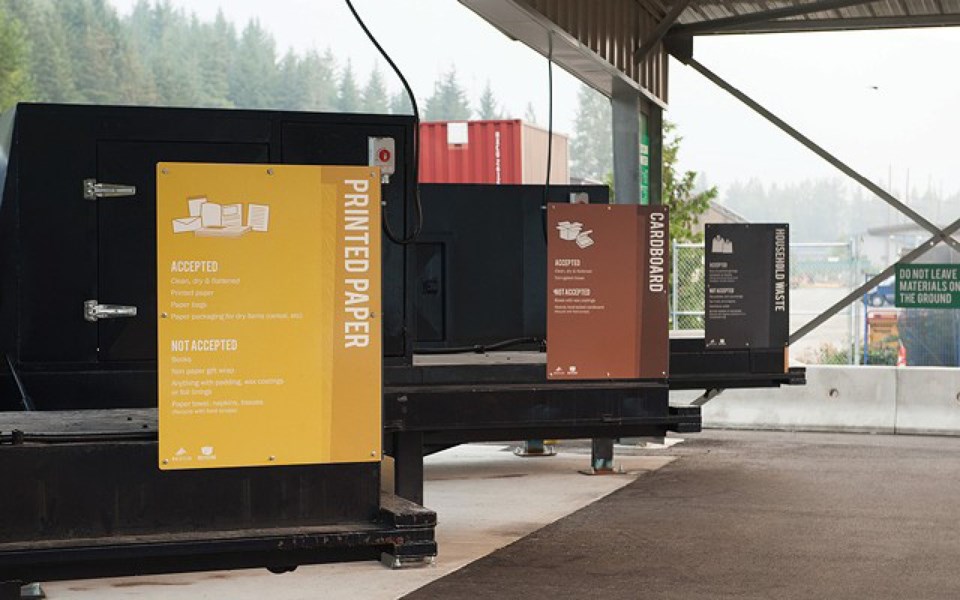Whistler's long-awaited Zero Waste Committee is one step closer to its first meeting.
At its Oct. 22 meeting, Whistler council approved the terms of reference for the committee.
The committee's goal will be to reduce the amount of waste generated in Whistler and subsequently sent to landfill.
While about 60 per cent of waste managed by the Resort Municipality of Whistler (RMOW) was diverted from landfill in 2018, the Zero Waste Committee will look at ways of reaching at least 90-per-cent diversion (the definition of zero waste).
The committee will be made up of the Mayor of Whistler, one representative each from council, the Association of Whistler Area Residents for the Environment, Whistler Blackcomb, the Whistler Community Services Society, a citizen-at-large and a staff member from the Squamish-Lillooet Regional District, as well as three RMOW staffers and three members of the business community.
Not all of council was on board with the new committee.
"You guys are going to need to convince me to support this ... lately I've been thinking, you know, we're trying to do all this stuff for the environment, and almost none of it works, almost none of it is going in the right direction," said Councillor Ralph Forsyth.
Forsyth said his thinking on this issue is informed by an episode of the NPR podcast Planet Money, which led him to research it more.
"The 10 most plastic-polluted rivers in the world are all in China or Southeast Asia ... the oceans are choking with plastic, because they just dumped it in the river and it floated down, so now I'm some sort of anti-Christ villain if I have a plastic bag, if god forbid I leave my shopping bags in the car," Forsyth said. "I think we need a whole rethink on the whole plan."
But Forsyth was alone in his stance.
"Ralph, you and I need to go for a beer after this," joked Coun. Arthur De Jong, who oversees Whistler's environment portfolio.
"Waste is a subset of the macro climate change issue—too much carbon in our biosphere—and we have to shift from a consumer society to a sustainable society, and this is one of the pieces that we need to step forward on aggressively."
Mayor Jack Crompton also voiced support.
"It saves us money, and it will move our community and our province towards impacting our environment less than we currently are," Crompton said. "The way you (Coun. Forsyth) have described it troubles me as well. I think being a British Columbian means that we have access to better systems, which is a reason I will vote in favour."
With no one able to convince him, Forsyth voted in opposition.
HOME BASED STUDIO BYLAW, WSL HOUSING PROJECT GET THIRD READINGS
A public hearing regarding a bylaw amendment to remove the Temporary Use Permit requirement for home-based artist studios drew positive comments from the local arts community.
Four people spoke at the public hearing—all in favour of the bylaw.
The TUP program that was put in place—with its fees and municipal selection process—caused the local arts scene to stagnate, said local artist Kathleen Tennock.
"Nature shows us that in order for something to thrive, in order for something to strengthen, there needs to be natural selection, and I find that natural selection can't happen in an office in the RMOW, it can't happen based on a set number of criteria and how many boxes are being ticked—it is whether it's good enough or not good enough," Tennock said.
"I find that that's the problem with the arts community sometimes in Whistler—that they're trying to put forth such a polished, homogenized product that we don't give the opportunity for natural selection, and for the general public to be the judge as to what is really worth supporting."
For those reasons, Tennock said, she supports the bylaw amendment.
Before the pilot program was introduced in 2016, sales from home-based studios were illegal.
"The temporary use permit pilot process and program allowed the municipality to determine the extent of home-based studios in the community, to monitor community and visitor response, and, ultimately, to confirm that these are compatible uses in Whistler's residential neighbourhoods (in advance of making a change to the overall zoning bylaw for the community)," Crompton said in a release.
With no one opposing it, the bylaw received third reading later in the meeting.
A public hearing for a zoning amendment bylaw for a Whistler Sport Legacies employee housing project in Cheakamus received no submissions, and was also given third reading at the meeting.




